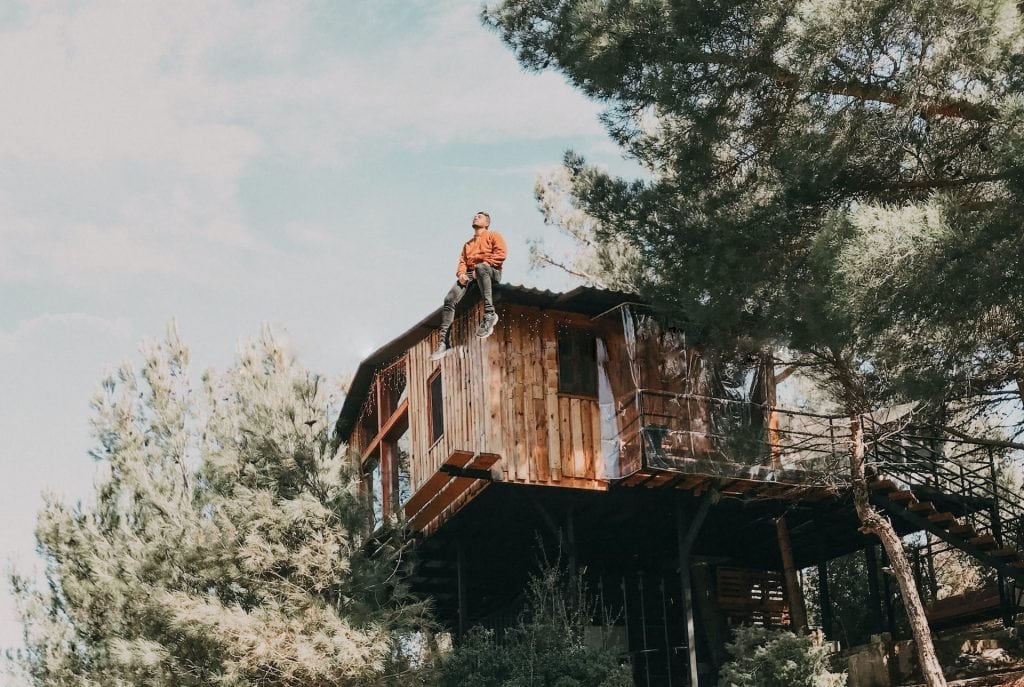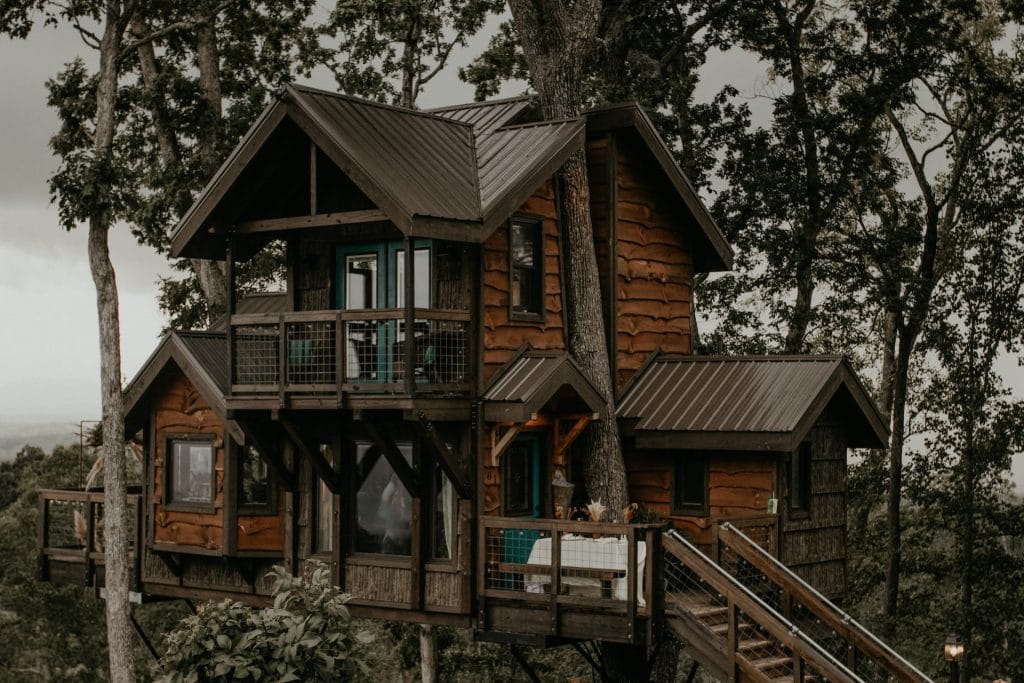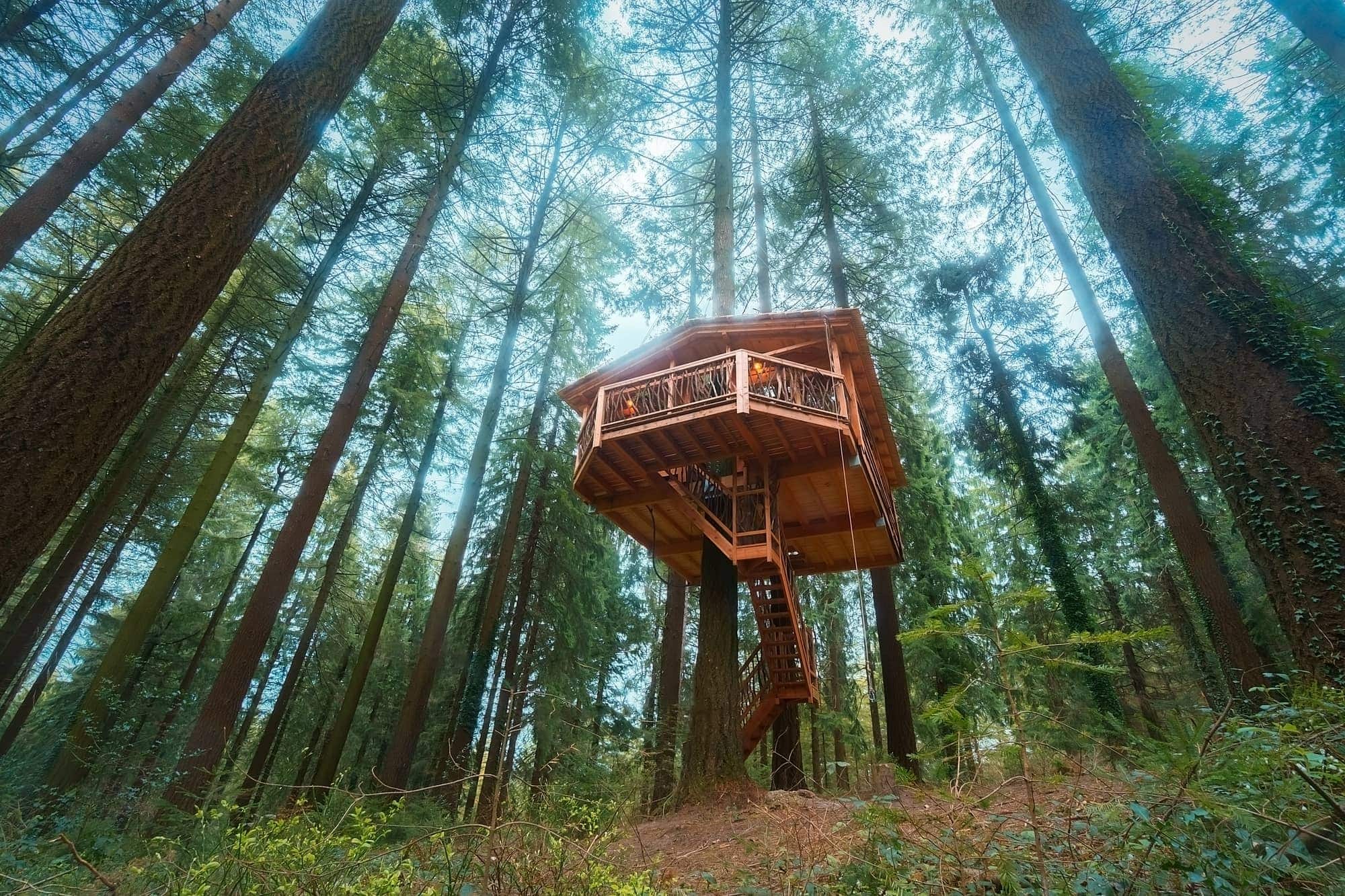Investing in real estate is always an exciting venture, but how about elevating the experience by investing in a tree house? Yes, you read that right! A tree house investment property could be your ticket to a unique and rewarding real estate portfolio.
Purchasing a tree house property in a good location can also increase its appeal and investment value. This could be a property with a unique design, located among the trees. It could be surrounded by nature, secluded, and private.
A well-maintained and desirable tree house property could bring in a steady stream of rental income and potentially appreciate in value over time. So, if you’re ready to mix your love for tree houses with a savvy investment strategy, keep reading this eXp guide.
Understanding the Appeal of Tree House Investment Properties
With the travel industry witnessing a growing shift towards unique accommodations, modern treehouses have found their niche as special vacation rentals or tree house hotels. It offers an experience steeped in the beauty of nature, and these elevated dwellings tap into a market of vacationers yearning for a slice of adventure. Many travelers view this adventure as an opportunity for a unique recreational home for family vacations.
What also makes them special is their impact on tourism as an alternative to a traditional hotel for their family vacation memories. You don’t often think of a tree house as an alternative to a hotel, but with this investment trend it is becoming more and more popular in the travel industry.
When you think of tree houses, you might recall the “Tree House Books” you read as a child that sparked your imagination and love for these dwellings. Today, those fantasy retreats have become a reality, but with a more modern flair.
Regarding recreational tree houses we are seeing everything from modest hideaways to luxurious modern alpine tree houses becoming the choice of accommodation with all the amenities needed for an unforgettable experience.
Unique Features and Benefits of Tree Houses
Their unique features that attract travelers seeking novelty and the joys of a close-to-nature experience are what sets recreational tree houses apart. Here are some key elements that make houses among tree canopies a promising investment:

Unique Accommodations: Tree houses offer a completely different living experience, much like the wonder and enchantment of “Tree House Books” but in real life. With each recreational tree house boasting its unique design, ranging from a Spruce Tree House King or Alder Tree House Double to the tallest, larger tree houses, there’s an allure that traditional property investments simply cannot match.
Close-to-Nature Experience: There’s nothing quite like waking up to the sounds of nature and the panoramic views of lush landscapes that tree houses provide. Whether it’s the scent of a noble oak tree or the rustle of leaves in the wind, tree houses offer an immersive experience.
Privacy and Seclusion: Treehouse plans, by their very nature, provide an oasis of privacy. Guests can enjoy a sense of seclusion. It’s one of the significant tree house amenities that include comfort and a break from the hustle and bustle of everyday life.
Environmental Sustainability: Investing in a tree house reflects a commitment to ecological sustainability. Many tree houses are built with eco-friendly materials and techniques, reducing the ecological footprint while offering a unique experience.
Adventure and Novelty: The sheer novelty of staying in a tree house adds an element of adventure that attracts a wide demographic of travelers, from families to couples, nature enthusiasts to adventure seekers.
Tree houses’ unique charm and high rental demand make them attractive investments. With the right marketing strategy, you can position your tree house as a must-visit destination, promising a steady flow of rental income.
Downsides of Owning a Tree House as an Investment Property
While the appeal of owning a tree house as an investment property is compelling, it’s also essential to consider some potential challenges. But don’t worry – with proactive planning, you can turn these into opportunities for growth.
Limited Seasonality: Depending on the location (that is commonly a remote or non-urban location), tree houses may face limited seasonality, particularly in regions with harsh winters or severe weather conditions. However, this can be an advantage by marketing the property as a seasonal retreat or incorporating features like insulation and heating systems that make it cozy all year round.
Higher Maintenance Requirements: Tree houses require diligent maintenance to ensure their safety and longevity. It includes regular inspections, repairs, and tree care. Consider hiring a professional maintenance service, which, while at an additional cost, ensures the upkeep of your investment and peace of mind.
Accessibility Challenges: By nature, tree houses have unique accessibility challenges. However, modern tree house designs incorporate ramps and lifts to make them more accessible. Such features can also increase the appeal of your property to a broader range of guests.
Zoning and Regulatory Constraints: Tree houses are subject to various zoning laws and building regulations, which can differ significantly from one location to another. This can include accessibility and safety regulations with a tree house property. There are also environmental regulations to consider with the location of the property.
Higher Insurance Costs: Given tree houses’ unique nature and risks, insurance can be costlier than conventional properties. However, consider this an essential investment in protecting your property. An experienced insurance broker can help you find the best coverage.
Key Considerations When Choosing a Tree House Property

Now that you understand both the pros and cons, here are some key factors to consider when investing in a tree house property:
Location: The location of your tree house can significantly affect its appeal and profitability. Even if the construction of tree houses occurs in a remote or non urban location, owners should consider factors like proximity to attractions, the natural beauty of the surroundings, and the local climate.
Privacy: The whole allure of a tree house can be dependent on this factor. You need to consider neighboring structures or public spaces and whether it provides the seclusion and privacy necessary.
Safety and Structural Integrity: A safe and sturdy construction is crucial for any tree house. Ensure the property has been built to high safety standards, ideally by professionals with expertise in tree house construction.
Tree Health and Stability: The health and stability of the actual tree(s) supporting the house are essential. Regular inspections by a qualified arborist can help detect and manage potential problems early on.
Legal and Zoning Considerations: You must know local building codes and regulations. A local eXp agent can be a valuable resource for this.
Amenities and Features: Amenities such as a fully equipped kitchen, modern bathroom, and reliable internet can significantly increase the appeal of any average tree house to potential renters.
Maintenance and Upkeep: Factor in the ongoing maintenance requirements of the tree house and the associated costs when calculating your potential return on investment.
How to Find Tree House Properties on the Market
When finding treehouse properties for sale, several resources can help you in your search. Here are some tips to guide you:
Online Real Estate Platforms and Specialty Real Estate Platforms: Websites like eXp Realty offer comprehensive listings of properties, including unique properties like tree houses. Use the advanced search feature to narrow options based on your preferences and investment goals.
Local Real Estate Agents: Engaging a local eXp agent can be beneficial as they have an in-depth understanding of the local market and might have access to off-market listings.
Explore Tree House Communities: Several communities worldwide are dedicated to tree house living. Networking within these communities can provide valuable leads and resources.
Local Advertising and Publications: Check local newspapers and real estate magazines. Sellers often use these platforms to advertise their properties, especially in rural or vacation regions where tree houses are more common.
Collaborate with Tree top Builders and Architects: If you’re open to building your tree house, collaborating with experienced tree top builders and architects can ensure a property tailored to your specific requirements.
Custom Building: In the end, if you are unable to find what you are looking for, attend a land auction in the location of your choice. Then, build your dream tree house property if your budget will allow.
Key Takeaways
Investing in a tree house property can be an exciting venture, offering a unique combination of financial benefits and the opportunity to own a piece of the great outdoors. Here are a few key takeaways from this guide:
- Understand the appeal and the unique selling points of tree house properties, from their close-to-nature experience to their potential for high rental demand.
- Be aware of the challenges associated with owning a tree house, such as seasonality, maintenance, accessibility, zoning laws, and insurance costs, and plan accordingly to overcome these.
- Consider critical factors when choosing a tree house property: location, safety, tree health, legal considerations, amenities, and maintenance requirements.
- Use various resources to find tree house properties on the market, from online platforms and local agents to tree house communities and local advertisements.
Whether you are a seasoned investor or a first-time buyer, owning a tree house investment property can be a unique and rewarding experience. Ready to explore the tree house market? Contact a local agent today to help guide your investment journey. You can also sign up for alerts when new custom eXp property listings land on the site.
Frequently Asked Questions: Tree House
You may have numerous questions regarding tree house construction, maintenance, and many more aspects. Here, we answer some of the most commonly asked questions.
What are the advantages of a tree house?
Tree houses offer a unique space for recreation and relaxation, connecting you closer to nature. They also provide an exciting play area for kids.
How to protect my tree house from thunder and lightning?
Install a lightning rod at the highest point of the treehouse. It will direct lightning into the ground, protecting your treehouse and tree from damage.
Building a treehouse, what do I need to consider?
Important considerations include the health and size of the tree, local regulations, safety measures, accessibility, and the design and materials of the tree house.
How long does a tree house last?
With proper maintenance, a well-built treehouse can last for several decades. The longevity largely depends on the materials used and the tree’s health.
How to build a treehouse?
Building a treehouse involves selecting a sturdy tree, planning a design, gathering materials, and constructing the treehouse with safety precautions. Professional help is often beneficial.
What is the definition of a tree house?
A treehouse is a structure built in the branches or around the trunk of one or more mature trees above ground level.
What is the life expectancy of a treehouse?
A treehouse can last 10 to 15 years, or even longer, with proper maintenance and care, considering weather conditions and the tree’s health.
What is the perfect tree for a treehouse?
The perfect tree for a treehouse is typically a mature, sturdy species like oak, maple, fir, or beech. The tree should be healthy, with a strong trunk and branches.
How do you keep rain out of a treehouse?
Use waterproof materials for the roof and walls. A sloping design for the roof can also help divert rainwater and prevent leaks.





